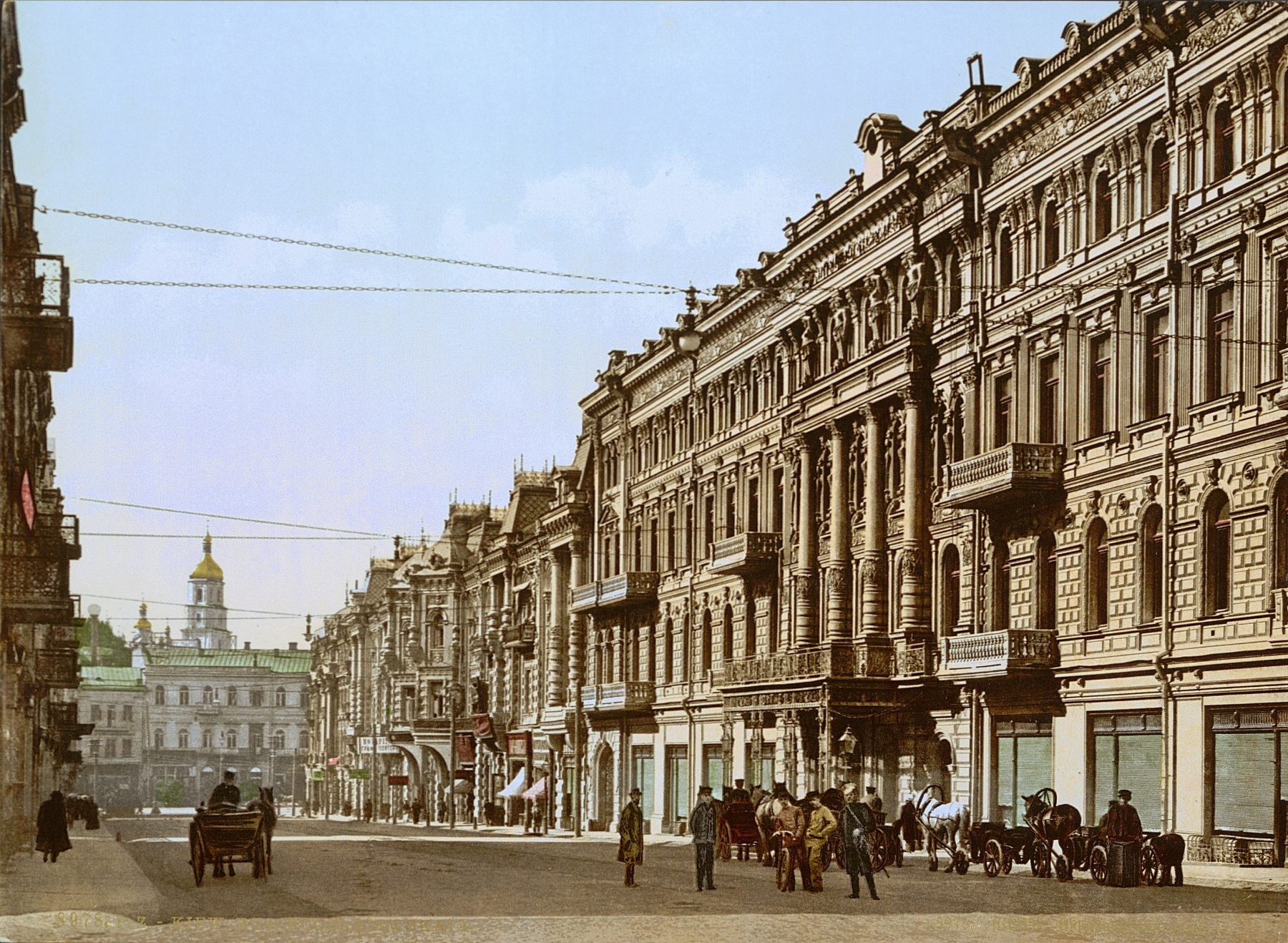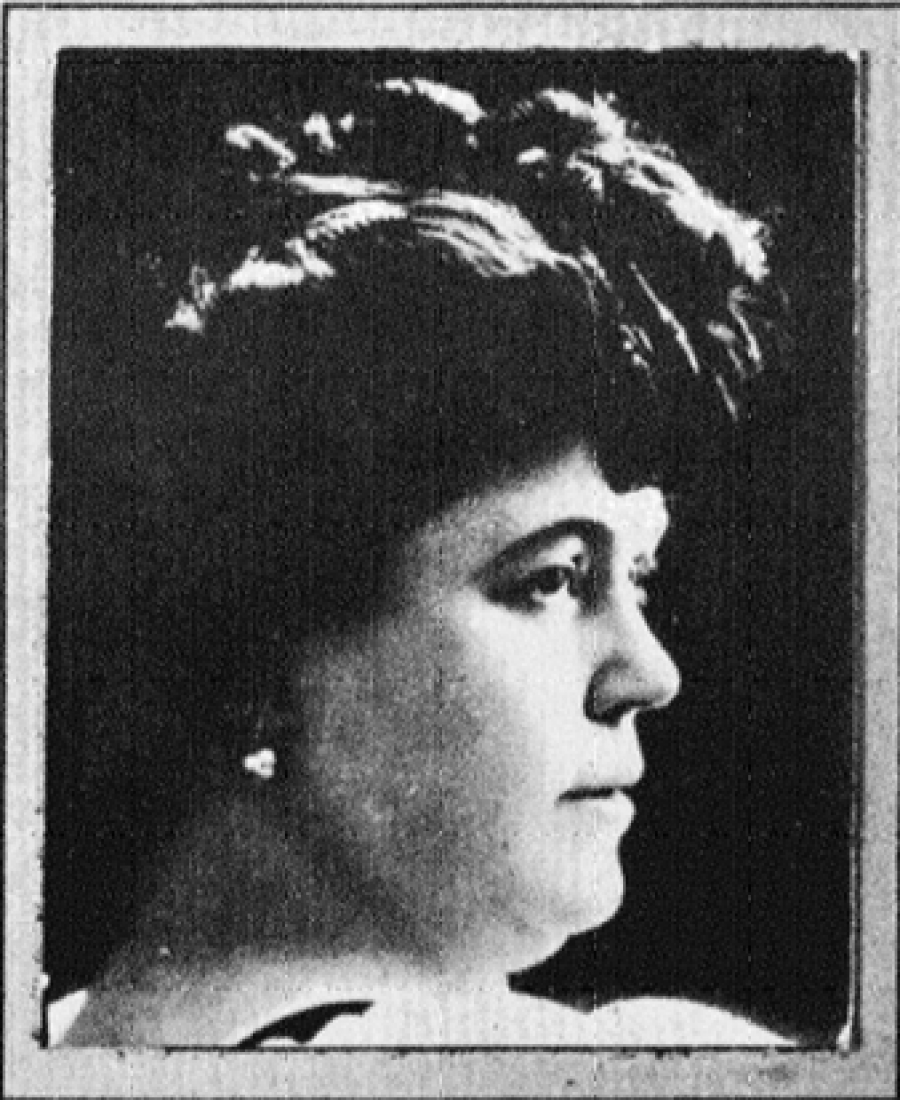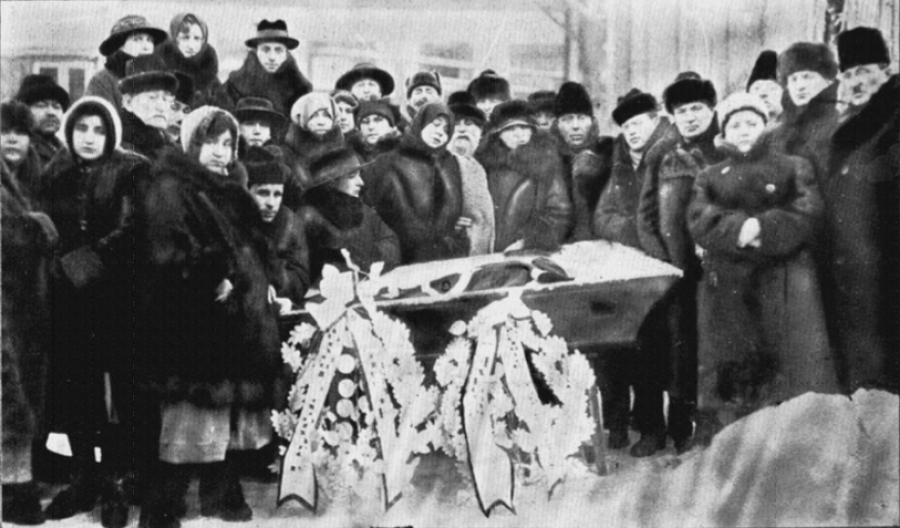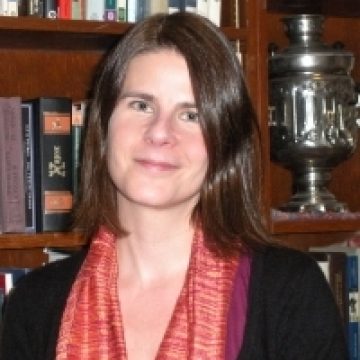
Kyiv in the late nineteenth century.
Avrom Fishzon, or the Berdichev Sheherazad
Barbara Henry
What do Yiddish theatre professionals do when all hope appears lost, when the very future of their art is in jeopardy? They recall the days when it was even worse.
In the summer of 1916, as the Great War raged, the actor and impresario Avrom Fishzon (1843?–1922) was doing what he had done for forty years: he was staging Yiddish plays in Russia and Ukraine. While the imperial German war machine complicated Fishzon’s work, it held few terrors for a man who faced down the tsarist bureaucracy throughout his professional life.
When Tsar Alexander III’s Department of Police of the Ministry of Internal Affairs effectively banned the performance of Yiddish theatre in Russia in 1883, the difficulties it presented led many theatre professionals to leave Russia. Fishzon, however, remained, and for the next twenty years he toured provincial cities and small towns, bribing and bamboozling officials, convincing suspicious police that his actors were actually performing in German, and occasionally confiscating those actors’ passports so that they couldn’t leave his troupe.
By the early 1900s, censorship of the Yiddish stage had begun to relax. The ban, whose exact contents were largely a mystery to the local police enforcing it, was thought to be nearing its expiration. It wasn’t, but the very murkiness of the law could work to Yiddish companies’ advantage. Yiddish troupes emerged from the shadows and began touring to St. Petersburg, Kiev, and Moscow (cities in which most Jews had no legal right to reside), and Fishzon’s company was among them.
Fishzon the Writer
Fishzon’s reputation as a pioneer of the Yiddish theatre in Russia was enhanced by the publication of his memoirs, “Zapiski evreiskogo antreprenera” (Notes of a Jewish Impresario). These were serialized in 1913 in the literary supplement to the prestigious St. Petersburg journal Teatr i Iskusstvo (Theatre and Art), and were later excerpted and translated into Yiddish for publication in New York’s Morgen Zhurnal in 1924. Fishzon’s lively literary voice, eye for the telling detail, deadpan humor, and lyric melancholy offer an engaging portrait of the Yiddish theatre in Russia in the years of the ban. Nor was the memoir his only appearance in the press.
In 1916, prompted by inaccurate reports about his company in Teatr i Iskusstvo, Fishzon wrote a letter to the editor, Aleksandr R. Kugel’. Fishzon’s letter gives some idea of the continuing vagaries of Yiddish theatre life in Russia, even after enforcement of the ban had slackened.
Dear sir!
Your eminent journal printed two brief notices from the Elisavetgrad Paper. One reported that my performances were allowed in Elisavetgrad, and the other that permission for me to perform had been refused. These reports are not entirely consistent… Not with reality—as in our reality, everything is possible—but simply with the truth itself, as I, with the help of God, am performing right now in Elisavetgrad, and I am grateful to the audience for raising my spirits with their attentions.
Fishzon reminded Kugel’ that Teatr i Iskusstvo’s readership was vast, and false reports could sway provincial authorities regarding the permissibility—or not—of Yiddish theatre. “Forbidding Jews to do something is as irresistible and infectious as yawning,” observed Fishzon wryly.
I humbly request, Mr. Editor, that you not trust newspaper reports about me. When you learn that somewhere someone has forbidden me to perform, don’t trust this rumor; and when you learn that I have been given permission to perform—don’t believe that either, or reprint that information. It’s healthier for the fate of our theatre. Our people’s long-suffering theatre has borne so much, bears so much, and will have to bear so much still! Do not make more difficult its road of sorrow.
Fishzon’s instinctive preference for flying under the radar of the tsarist authorities was, of course, at odds with his own nature as an actor and with the need to publicize his troupe’s performances. A compromise appears to have been reached between these competing impulses, as Fishzon returned to the pages of Teatr i Iskusstvo in July, 1916 to mark—sort of—his fortieth anniversary working in the professional Yiddish theatre in Russia.
From the Notes of a Jewish Impresario: Part One
Avrom Fishzon
I haven’t written in a while. Could barely lift a hand to do so. But my latest troubles are just old wine in new bottles, and the kind, encouraging responses to my letter in issue 28 of Theatre and Art have imbued me with renewed vigor.
I’m like an old workhorse that pulls a postman’s cart, who’s spent her whole life being run ragged and is now exhausted and on her last legs. But suddenly she hears the irresistible, enticing sounds of the harness bells, and she stirs involuntarily, rallies, lifts up her head, and finds the strength to stand tall again, imagining that she can still show the world a thing or two. I’m the same way.
Apparently, I myself requested not long ago that no one write anything about me (no irony intended), and even refrain from observing any anniversary celebrations. What is there to observe? What is there to celebrate, when our own theatre isn’t a theatre? It has no foundation, no flagship stage, no authority to perform legally throughout the land in the Jewish tongue—only at the whim or humor of a government official. Without a foundation, what’s the point in adding further stories to this structure, of marking anniversaries?
But the bells are jingling, and the exhausted, wasted postman’s nag goes into harness again. And my wife [Khine Braginskaya, 1867–1951], my faithful partner in life, gives me strength; she is, after all, a woman, a daughter of Eve, and she ate of the tree of knowledge of good and evil…She sticks a piece of clean white paper in front of me, pen, and ink, and from the expression in her eyes and her admiring smile, I can already see what she has in mind.
“Go on, Avramele, jot down a few words, memories for your anniversary. Thank God we’ve lived long enough for such a day. Forty years, forty long, momentous years! Write and remember, for people to read.”
As always in our life, I am used to obeying her, so I obey her now. […]

Khine Braginskaya-Fishzon, early twentieth century. From Zalmen Zylbercweig’s Albom fun yidishn teater (Album of the Yiddish Theatre, 1937).
Kiev
It happened once that I made great efforts to obtain permission to stage a play in Kiev. We had a colossal success there. There was no end to the applause and the ovations. It was the first time that a Jewish audience could see a Jewish company in a Kiev theatre, could hear their own mother tongue from that stage. They showed us so much warmth and heartfelt emotion, they were so attentive, covering us with flowers, and even presenting me with a laurel wreath. They held a banquet in my honor in the theatre, read out congratulations, offered toasts and speeches. I was compared to the moon and the sun that had warmed and illuminated their gray lives—and my troupe, my fellow travelers—were likened to the stars. But despite this manifest success, I had not a single moment without fear.
The thing was, the authorities had given us permission to stage a performance, but not to stay the night in Kiev. I had some hope that the members of the public who were celebrating with us would stay until morning, and that we would make a swift exit from the theatre straight for the train station. Alas, no! The wine bottles emptied, the crowd began to thin out, and soon they had all said their good-byes. After all, everybody had their own home, their own “residence permits,” and only my actors, my fellow travelers—the stars; and I—the sun—had no idea where we would spend the rest of the night.
Then my lead comic actor hit upon the bright idea of spending the night in the theatre. Everybody, of course, joyously endorsed his proposal. But our plan encountered a fierce opponent in the theatre’s doorman, who insisted that it was time to clear out. At first he’d taken our proposal as a joke, but seeing that our intention to remain in the theatre until morning was real, he was astonished.
“Where are you going to sleep?” he asked. “On these hard chairs, in all this dirt? I’ve worked here for twenty years and this is the first time I’ve seen actors like this.”
Ironic, isn’t it? The sun, the moon, the stars that had that very evening shone for the whole audience, could now find no favor with a doorman.
Then, on the advice of a friend, I shoved a five-ruble note into the doorman’s hand, and everything took a completely different turn. At my request, the doorman and his wife brought us a few grubby pillows and a couple of carpets that had, minutes before, been lying on the stage. My actors hastened to settle in on the chairs, but the doorman was completely unable to contain his astonishment, and said to his wife, “I’ve seen a lot of actors in my time; the wandering, traveling companies who walk along the railway tracks; the hungry, ragged actors who play to empty houses, the ones abandoned by producers, who have to barnstorm the world. But actors like these I’ve never met. They were a hit! They had huge takings, and flowers and they got expensive presents! I mean look, they shove five-ruble notes your way, but they’re too cheap to go to a hotel. I don’t get it.”
But how to explain that we had permission to perform in Kiev, but not to stay in it? Because of this, I announced that we’d be going right back to Vasil’kov [a town 25 kilometers south of Kiev, where many of the troupe lived]. My actors quietly talked amongst themselves, and my comic lead was vociferous in asking why all of us were here on these hard chairs – even our impresario, who was the object of so much interest, but who was afraid to show his nose in Kiev?
I’m very nervous and glance at my watch every minute. But time unfurls with agonizing slowness – only four hours have passed. Little by little, though, everyone nods off. Even I may have fallen asleep. Then the doorman starts waking us one by one, calling out, “6:30!” Everybody jumps up, shivering; they grab their things and run out to the street, and call a carriage to speed us off to the train station.
The only witnesses are two night watchmen and a police officer, who look with some amazement at the bouquets of flowers that my performers carry out of the theatre. The doorman follows me, hauling the giant laurel wreath. What did I need this for, he asks? So in addition to giving the doorman a five-ruble note, I also have to throw in a few coins.
At the station we were met by some of the audience from the night before; a couple of the young people who’d been at the banquet invited my actresses to tea. They leapt at the invitation not because they were particularly thirsty, but because they wanted to warm up. So that’s how we passed the time until the train arrived. Then we’re on the train, and in two hours we’re in Vasil’kov. Everyone went home their separate ways, hastening to stretch out their tired bodies – free of fear – in their soft, warm beds.
Fact-checking Fishzon
It is difficult to say exactly when Fishzon’s troupe spent their uncomfortable night in Kiev. Newspaper advertisements and reviews put his company in the city in September of 1896—but for a two-week run, and they returned to Kiev for four months in the spring of 1897. So these are unlikely candidates for what Fishzon calls the “first time” that Kiev audiences saw a play in the mame loshn. Could the theatre camp-out have occurred in the 1880s, just after the ban? Or even in the late 1870s? Perhaps—but Fishzon’s description of events that follow the Kiev story complicates that dating, and suggest that the Kiev adventure took place in the early twentieth century.
This is not to say that things didn’t happen as Fishzon depicts—they absolutely could, and probably did—just not exactly where, or when he describes. Was it Kiev? Was it Minsk? Does it matter? It could be both, it could be neither. In Fishzon’s long life, the Yiddish theatre in Russia inhabited a strange, interstitial dimension—underground, but onstage, permissible but forbidden, Jewish but “German,” elevating but populist—and that shifting unreality informs Fishzon’s memoirs as well. Both more and less solid than they appear, they take the enchanted reader backstage at the Yiddish theatre and show us around, and while we’re enjoying ourselves, delighted by the intimacy of our access, our host vanishes discretely into the dark of the wings, and into the Russian night.
From the Notes of a Jewish Impresario: Part Two
Avrom Fishzon
The next day my actors got together in town, and everyone asked how the performance had gone. They told their friends, showed them the poster from the Kiev show. Their friends read it and basked in our success. Some of them wanted to know when we would finally favor our town with a performance.
Unfortunately, in Vasil’kov this was an impossibility.
In all of the towns and villages where we’d been, it had been possible to adapt a woodshed or barn for use as a theatre, and there had even been a happy occasion when we’d found a wedding reception hall. In Vasil’kov, though, you’d be hard pressed to find a shed with space enough for even a chicken coop. So the people of Vasil’kov had to be satisfied with the fact that we lived with them, but performed elsewhere.
Two months passed in this fashion, and the Christmas holidays approached.
One evening, one of the most prominent and wealthy men in town came to us and offered his congratulations on the three performances that we were going to give in Vasil’kov.
Everyone peppered him with questions: “Where? When?” It turned out that he had asked the high school’s administrators for permission to stage performances in the school over the Christmas vacation.
In an instant, the news was all over town. It was the only thing people talked about. The next day young people even came to us for tickets. My actors got to work: they designated a space for the stage, set up chairs; but despite our economical use of space, it proved impossible to fit more than a hundred and twenty seats in and to still leave space for standing-room-only tickets.
I didn’t just put my feet up, either, but grabbed the poster from our Kiev show and went to the district chief of police for permission to perform.
The district chief read the poster and announced, “That’s fine, but I don’t want to allow it in my town.”
I point out the signature of the chief of police in Kiev, but he doesn’t want to know any more, and advises me to go to Kiev and perform there. I left stunned.
The news astonished not only our actors, but everyone in town. Everybody was outraged at the unfairness of the district chief. Everyone asked the same question—why were we allowed to perform in Kiev, but not here?
The next day some prominent townsfolk came to me, led by the state-appointed rabbi. They consoled me and said that they were going right now to see the district chief, and they hoped to get permission to perform. I thanked them for their help and support, of course, and wished them success.
You can easily imagine the impatience with which we awaited the answer. My lead comic even kept watch over the district chief’s house while awaiting the result. Finally, they returned with happy faces, crying, “permission granted!”
Everyone rejoiced. I alone could not entirely share their joy.
I turned the Kiev poster over, which the district chief had signed. And there it was. The words “in Yiddish” [po-evreiski—“Jewish”] had been crossed out, and in their place was written “in German.”
No, I’m not performing, I told them.
“Why?” they all asked. So I explained.
Oh, that miserable German tongue! How much have I had to endure because of it. How much misery has it caused me, my wife, and all of my apprentices. How many times have I been taken to court, how many doorways have I darkened in order to plead with experts to concede that I am performing in German—that even though they don’t understand me, it’s not Yiddish. And now, when I’m finally getting somewhere, when I’ve had permission to perform in Kiev in the Jewish tongue—the district chief in Vasil’kov forbids it.
He wants it in German, for some reason.
Even at that time I could not calmly hear the word “German.” Many times I asked myself why in Russia the German language was elevated over the Jewish one. I was so embittered towards German that if given the opportunity, I would have declared war forty years ago, when it would have been easy to vanquish it. Now the German language would be neither heard nor seen and I would be left in peace. At one time my fury reached such a fever pitch that I was prepared to duel with a wretched German, but my wife calmed me down. Her heartfelt words acted like a balm on my weary soul. “My husband, listen,” she said, “If we can survive the eras of Gonta, Khmel’nitsky, and Karmaliuk, then we can survive that wretched Hun. There will come a time when we will perform in our native Jewish tongue.”
As you see, her hope was not misplaced. Now it’s absolutely forbidden to perform in German, but the Jewish tongue is permitted. But do any of these impresarios know the blood that I shed over the ban on performing in Yiddish, and the requirement that we perform in German? It was only with the help of good people and the former State Duma representative, the late O. Y. Pergament [1868–1909] – who always helped me out of difficult situations – that I managed to overcome all of these obstacles. Mr. Pergament composed a telegram for me to send to the prerogative court of His Majesty, and on August 28, 1904, I sent the telegram, a copy of which I retain among my papers.
At that time, the chair of the censorship commission was General Kobeko [1837–1918]. I received word that all of the Yiddish plays that the Commission had found eligible for performance would be stamped: “Permission for performance granted by censor. Petrograd.”
It was the first ray of light in our gloomy actors’ life.

Avrom Fishzon’s funeral in Harbin, China, January 1922. From Zalmen Zylbercweig’s Albom fun yidishn teater (Album of the Yiddish Theatre, 1937).
Fishzon’s Trompe l’Oeil
In the years of the ban, stories of the subterfuge that Avrom Fishzon undertook in order to perform in Yiddish became the stuff of legend. Like all legends, they contain elements of historical fact, but the particularities require untangling. Like our own memories, the memoir form edits and conflates characters and events; it fragments and compresses time, as when Fishzon quotes the 1904 notice issued from “Petrograd,” a name used only after 1914. In the best sense, Fishzon’s memoirs are as literary as he is theatrical.
There is little doubt that the town of Vasil’kov, which had a substantial Jewish population, would be interested in having Fishzon’s company perform, or that local police would reflexively oppose this. But a more likely source for this story is connected with the troupe’s travails not in Vasil’kov, but Minsk, in the autumn of 1903.
After performing in the provincial capital of Minsk for two months, Teatr i Iskusstvo reported that Fishzon’s company was moving on to the much smaller city of Pinsk. To Fishzon’s surprise, the police there refused to allow his troupe to perform. So they headed to Kiev instead, but their run there came to an abrupt end in early November, when actors lacking residence permits were told to clear out of town. These events overlap with the concluding episode in Fishzon’s memoirs – that of the telegram sent to Tsar’ Nicholas II himself.
Friends in High Places—If Not Higher
It wasn’t the first time that Fishzon sought leniency from the very government that harassed him. In February 1900, as John Klier documented, Fishzon appealed to the Ministry of Internal Affairs to overturn the ban. When this was rejected, Fishzon simply applied again in 1901. The actor Vera Zaslavskaya (1883–1939) recalls that through connections that her husband – Fishzon’s son, Misha (1880–1949)—had in Petersburg, they learned that only the tsar himself could overturn the ban. Zaslavskaya confirms the August 28 date of Fishzon’s 1904 telegram, and remembers their hastily rewriting the company’s “German” scripts in Yiddish for submission to the Petersburg censor. Fishzon returned from the capital five weeks later, with a poster advertising his company’s performances beginning August 20 in Khar’kov: “With the permission of the government, Avrom Fishzon and Son’s Yiddish troupe will be performing at the Villa Zhatkina.”
These performances could only have been scheduled for August 1905, by which time Russia was engulfed in empire-wide strikes, riots, and rebellions. In October 1905, Nicholas II reluctantly conceded to popular demands for change; among the reforms granted—a parliament, the first constitution—came a less rigorous censorship of the press. The latter was overseen in part by Dmitrii Kobeko, and benefited all theatres in Russia, not just the Yiddish stage.
In Fishzon’s memoir, events from different times and places assume a linear character and a reassuring alignment of cause and effect. Anchoring the “Notes of a Jewish Impresario” in historical fact disrupts that linearity and complicates the cherished mythos of the Yiddish theatre, supplanting its engaging fictions with quotidian truths.
Zylbercweig Takes Stock
For many years, Fishzon’s memoirs were relatively inaccessible, and scholars could neither wholly substantiate nor disprove his versions of events. Perhaps it was for this reason that Zalmen Zylbercweig (1894–1972), indefatigable historian of the Yiddish stage, delayed publishing Fishzon’s biographical entry in the Leksikon fun yidishn teater. As Faith Jones has documented, Fishzon’s was one of the very first biographies that Zylbercweig prepared when he was raising funds for the Leksikon in 1928, only six years after Fishzon’s death in Harbin, China. Yet Fishzon’s biography never appeared in Zylbercweig’s lifetime. Only in 2017, when the Digital Yiddish Theatre Project published volume seven of the Leksikon on this website did Fishzon’s biography become accessible. In it, Zylbercweig collates, confirms, and questions many elements of Fishzon’s memoir, drawing on sources in many languages, scattered across many lands. Yet Fishzon’s charm, energy, and fierce love of the Yiddish theatre remain undimmed.
For almost fifty years, Fishzon evaded the dead hand of tsarist censorship, the sticky paws of local police, the Bolsheviks, and worse. But for a long time he gave us the slip as well—winding his way in and out of his family’s memoirs, popping up in moldering Russian newspapers and smudged copies of Morgen Zhurnal; now enjoying a digital presence in a new millennium. As Fishzon’s memoir attests, metaphor is more powerful, more capacious, and more durable than reportage. What we recover with facts and dates will never surpass the delight of Fishzon’s own words. His life’s work is eloquent proof that acting and the theatre are forms of liberation that will always elude capture, even by the most admiring of sleuths.
Acknowledgments
A sheynem dank to Alyssa Quint for generously sharing her copies of Fishzon’s Morgen zhurnal memoirs and Khine Braginskaya’s in Der tog.
